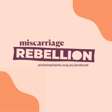
S2: E4: Purpose From Pain: Finding Sanctuary After Recurrent Loss
In this candid episode, the host welcomes Jacqui Maloney to share her journey through recurrent pregnancy loss and her fierce advocacy for the grief community in Western Australia.
Jacqui recounts the devastation of her first loss which led to intense, unmanaged anger and isolation, where her coping mechanism was to return to work immediately and silence any conversation about her grief. Two years later, a second loss was terrifying. Jacqui explains that her losses disrupted her personal narrative and identity, leaving her currently childless not by choice and struggling daily with triggering questions like, "How many children do you have?"
The second loss was a turning point, which prompted her to "do things differently." She shared openly and discovered a widespread hidden community of women who thanked her for finding the words they couldn't. This experience taught her to articulate her needs by asking friends to switch from, "How are you?" to "What can I do?" and to simply acknowledge the difficult due dates.
Jacqui has channelled her pain into purpose by becoming the Chair of the King Edward Memorial Hospital Rose Garden committee in Western Australia. This beautiful, hidden sanctuary holds the ashes of an estimated 45,000 lost babies. Jacqui highlights the garden's power as a safe, physical space for grieving mothers to connect and reflect, creating the vital ritual so often missed after early loss.
The episode concludes with a powerful call to action: The "gap" after leaving the hospital—where women are given no follow-up and no information for emotional support—must be filled. Jacqui argues that the alarmingly different levels of care are unacceptable and only exacerbate the disenfranchised grief felt by those searching for validation.
EARLY PREGNANCY LOSS SUPPORT
If you or someone you know has experienced miscarriage or early pregnancy loss, please know you are not alone.
- For crisis support, please call Lifeline - 13 11 14.
- Access all our support
- Connect through Live Chat with Peer Support
- Join Online Communities
- Call out Pregnancy Loss helpline delivered by PANDA
- Join the Circle of support
- Follow @pinkelephantssupport on Instagram.
STACEY JUNE LEWIS
You can follow our host Stacey on her personal Instagram account where she shares some of her lived experience.
Pink Elephants thanks the Australian Government for their support in funding this podcast series under the Miscarriage Support grant.


